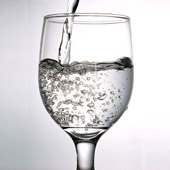
Purpose
To determine which liquids will mix with water.
Additional information
Water, the nectar of life! There is an abundance of water on the planet, with over 70.9% of the earth covered by it. It's also a vital component for all known forms of life on Earth and has the most commonly recognized chemical formula, H2O. What would happen if we try mixing liquids with varying densities with water, which has a density of about 1000 kg/m3? Let's have some fun and find out!
Sponsored Links
Required materials
- Various liquids made up of different compositions. We recommend:
- Orange juice
- Olive Oil
- Milk
- Laundry detergent
- Rubbing alcohol
- Shampoo
- Maple syrup
- Several jars (to match the number of liquids you'll be experimenting with)
- Long necked spoon or stirrers
- Lots of tap water
- Pen or pencil
- Notebook or journal to record your results
Estimated Experiment Time
Approximately 20 - 30 minutes
Step-By-Step Procedure
- 1. Fill each jar with an equal amount of water. The amount of water will depend on the size and shapes of the jars being used, but each jar should be about 1/2 full.
- 2. Place the jars of water on a table in order (Jar #1, Jar #2, etc).
- 3. Add one to two tablespoons of liquid to each jar. Don't mix the liquids... each jar should have one, and only one, type of liquid (ex: Jar #1 gets Milk, Jar #2 gets Shampoo, etc).
- 4. Use your long necked spoons to mix each jar. If using the same spoon for each jar, be sure to rinse it between mixings so not to cross-contaminate the liquids.
- 5. Once the liquid has settled, look closely at each Jar. Record the results in your journal.
Note
Be creative with the liquids you try mixing with water. You can use just about any liquid (or liquid-type substance) found in your household. A few more examples include chocolate syrup, raw eggs, molasses, and melted butter.
Observation
What's happened to the liquid in each jar? Has the liquid mixed with the water? Has it sunk? Has it floated? Were the results what you expected?
Result
Not all liquids will mix with water. It all depends on the liquid density and propensity to dissolve in water. Some liquid, such as oil, is lighter (or has a lower density) than water and floats on the top of the jars. Other liquids, such as the maple syrup, have higher densities than the water and thus sinks to the bottom of the jar.
Sponsored Links
Take a moment to visit our table of Periodic Elements page where you can get an in-depth view of all the elements,
complete with the industry first side-by-side element comparisons!